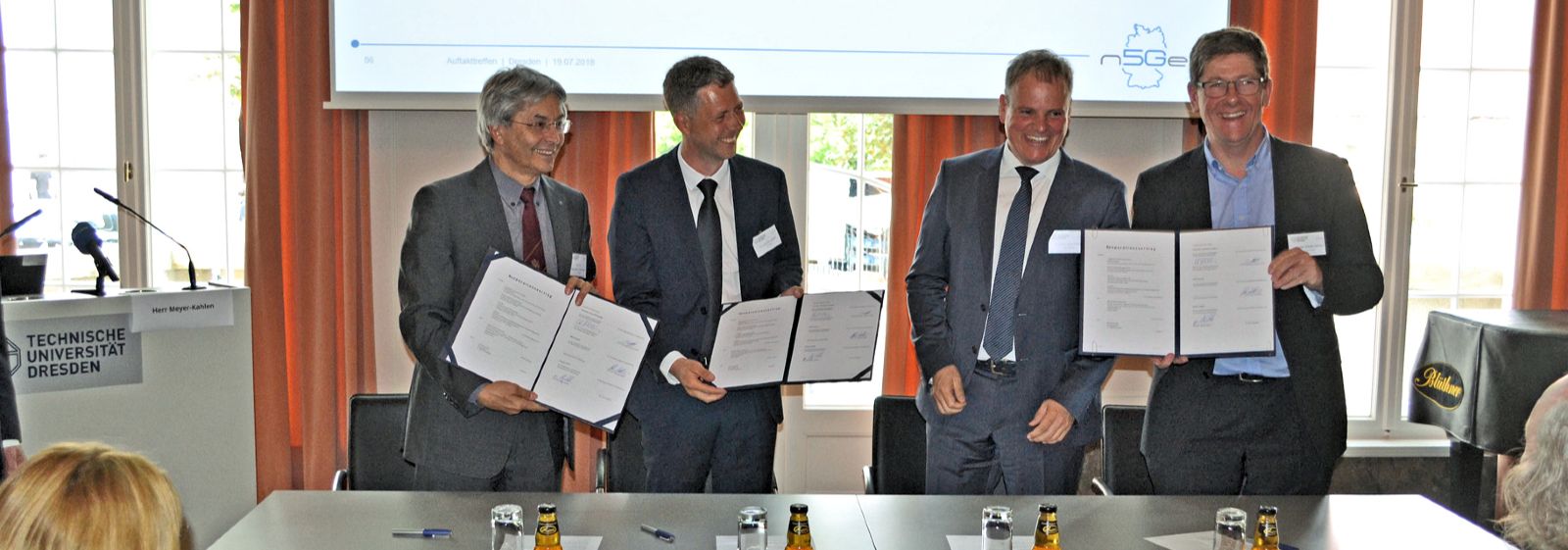
Digitalization
Launch of the National 5G Energy Hub project
Last week, at TU Dresden, the official launch of the long-term research project "National 5G Energy Hub" took place. The aim is to make the future mobile radio standard 5G usable for applications in energy technology. Project partners are TU Dresden in cooperation with RWTH Aachen, Deutsche Telekom and Ericsson. The associated partners Techem, VDZ, E.ON and the City of Dresden are also involved. In the presence of Dr. Tryfonidou from the Federal Ministry of Economics and Energy, the cooperation agreement was signed at a ceremony in Dresden on 19 July 2018.
Digitization is one of the big, challenging topics of our time and will affect all areas of life in the future. The media and telecommunications in particular play a pioneering role here. With the introduction of 5G technology, new possibilities will be created in the coming years to make modern radio-based methods for data transmission applicable also for classical industries. Energy technology in particular could benefit from this development, as the energy transition will mean that many decentralized plants and components will have to be integrated into the existing infrastructure in the future. This leads to a fundamental change in the supply structures from a centrally oriented to a decentralized, cellular supply structure that is regionally oriented and must offer a high degree of flexibility.
Energy transition and digitization bring fundamental change
The project partners want to actively support this process in three project phases and develop solutions by 2028. The research questions are handled by an interdisciplinary team consisting of experts in thermal energy technology, electrical energy technology and telecommunications technology. Dr. Tryfonidou from the Federal Ministry of Economics emphasized the importance of digitization for energy technology and explained how information networking will continue to play an important role in the coming 7th Energy Research Programme. Mr. Mayer-Kahlen of Ericsson referred to the possibilities offered by 5G radio technologies for energy technology. Short downtimes and the combination of many end application devices made the energy turnaround possible.
Project National 5G Energy Hub
Afterwards Prof. Dirk Müller (RWTH Aachen) and PD Joachim Seifert (TU Dresden) explained the main topics of the project. The project is divided into three phases. In the first project phase now starting (2018-2020), the basic techniques and software modules for the use of 5G technology in the energy sector will be developed, including thermal and electrical sensors, a gateway system and structures for a central backend. In addition, control algorithms are to be developed that enable bidirectional control of decentralised energy generation and consumption systems. The planned open source platform for 5G technologies in the building sector as well as for energy distribution systems is to be made usable for companies.
The second phase of the project (2020-2024) deals with the transfer to products and services. Medium-sized companies in particular are to be supported in their efforts to digitise company-specific products and services. In the subsequent field test phase (2025-2028), further applications are to be processed and the technology will be tested in real laboratories.

